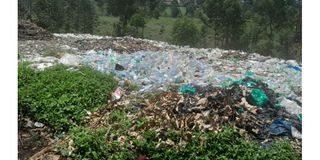Poor waste disposal and management is a threat to health and the environment

What you need to know:
- Human activities generate waste and the amounts tend to increase as the demand and quality of life increases. There are emerging types of waste such as e-waste, computers, cellphones, electronic masks, sanitary towels, diapers and others are likely to create more challenges.
The status of waste disposal in the slum areas of Kampala is highly unhygienic and unsatisfactory.
With an increase in the urban population and rising demand for food essentials, there has been a rise in the amount of waste that is being generated daily by each household.
According to Kampala Capital City Authority (KCCA), which is responsible for collecting garbage and waste management, the amount of waste generated overwhelms its capacity to collect and dispose. This is evidenced by the garbage that is seen along the pathways and streets in the slum areas of Kampala.
Out of 1,200-1,500 tons of garbage generated everyday, only 400- 500 tons is collected giving a collection of only 40 percent. This means that 60 percent of solid waste generated daily is not properly collected and disposed of, which has resulted in indiscriminate disposal by the public.
Human activities generate waste and the amounts tend to increase as the demand and quality of life increases. There are emerging types of waste such as e-waste, computers, cellphones, electronic masks, sanitary towels, diapers and others are likely to create more challenges.
Urbanisation and industrialisation has seen an influx of people move from rural areas to urban areas and this has resulted in unplanned settlement in the city especially in the slum areas of Kisenyi, Katanga, Kavule, Bwaise, Kamwokya and many others. This has led to insufficient space to store recyclable plastic waste, particularly in the improvised urban areas like slums and about 60 percent of the Kampala population live in slums.
Poor waste disposal has led to blockage of drainage patterns leading to increased dirty stagnant water which has increased breeding places for mosquitoes which has increased the incidence and prevalence of the malaria disease. Moreover, poor waste disposal has led to the contamination of waste sources posing a high risk of contracting waterborne diseases like cholera, typhoid and fever especially among the vulnerable populations in slums.
Many people die of diarrhea and cholera, especially the children in the slum areas, this is due to poor hygiene and sanitation, drinking of contaminated water and poor sanitation is the leading cause and this is mainly attributed to poor waste disposal.
Dumping of waste on the streets and pathways has increased more environmental threats such as land degradation, water and air pollution, obstruction of drainage, loss of biodiversity, emissions of methane impacting the quality of air and climate change.
The issues of poor waste management continue to rise due to poor urban planning, infrastructure and inadequate funding. The rapid population growth has outpaced the ability of the urban authorities to provide adequate housing, roads, water supplies and garbage collection centers.
Although organizations and urban authorities have tried to work on the issue of waste disposal, a lot more interventions need to be put in place. I therefore recommend that the government should put in place policies to regulate waste management and also encourage investment in the industries that turn waste into energy since the option of landfills from garbage only increases the production of methane in the environment.
Government authorities such as KCCA, NEMA and Ministry of Water and Environment should work together to develop the compositing plant to clean the environment, however most of the compositing plants are overwhelmed by waste dumped at these sites. These plants are used for dumping sites yet they should be used for processing waste into compost manure.
Ensuring the involvement of civil society groups, youths, women, private sector and cultural organization in climate action.
Modery Gumisiriza, Co-founder of youth for nature conservancy
[email protected]




